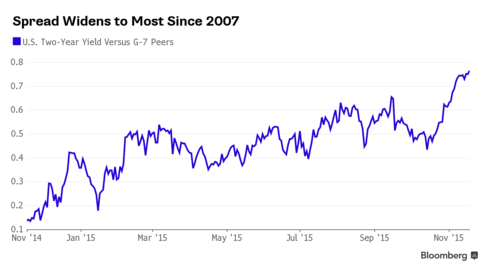If this weekend’s gruesome terrorist attack on Paris ended up being hugely bullish for stocks, then two subsequent events, a stadium-evacuation scare in Hannover (where Angela Merkel was supposed to be present) and a raid in north Paris which left several dead in the ongoing manhunt against the alleged ISIS mastermind, appear to have but some question into if not stocks then algos whether a rising wave of terrorist hatred across Europe is truly what central bankers need to unleash more QE. That said, we expect the current weakness to last only until the traditional USDJPY carry ramp pushes stocks traditionally higher.
Quick summary of overnight events: European, Asian shares fall after a shootout between police and suspects in Friday’s Paris terror attacks; U.S. futures also slide while oil, gas rise. Fed meeting minutes due later today. Traders snuffed out an early rally in Asian stocks, sending the benchmark index lower before end of Bank of Japan policy; In China stocks fell for a second day, led by industrial and technology companies, after President Xi Jinping said the nation’s economy is facing “considerable downward pressure.” Additionally, there was an unexpected weakness in Chinese housing, where home prices rose in 27 cities in October, down from 39 in September.
Market Wrap
The key event on the calendar today will be the Fed’s October minutes, which while dated, are expected to validate the December rate hike message. Expectations for a U.S. rate hike have shot up from 35 percent on Oct.27 to 66 percent, according to Bloomberg data. Elsewhere, the Bank of Japan starts a two-day meeting just days after it was revealed the economy sank into a recession. Don’t expect any change in stimulus. That’s the view of all 41 economists surveyed by Bloomberg News.
As Bloomberg notes, the widening spread – or difference – between the yield of U.S. two-year notes and their G-7 peers is now 76 basis points, the widest since July 2007. That reflects the view the Federal Reserve is ready to raise interest rates for the first time since 2006. It also highlights a divergence in monetary policy between the world’s biggest economies. While the Fed contemplates tighter policy, the European Central Bank has signaled it’s ready to boost stimulus next month, while the Bank of Japan has pushed back its deadline to achieve stable 2 percent inflation, raising the possibility of more bond-buying.

Elsewhere the commodity carnage continues, and the sell-off in industrial metals continues unabated. Zinc has fallen to its lowest since July 2009 as concerns persist about slowing demand from China. The dollar’s strength is also weighing on the metal used to galvanize steel. The Bloomberg Dollar Spot Index has risen to its highest in a decade ahead of next month’s Fed meeting, making dollar-denominated commodities more expensive for buyers in other currencies. Output cuts from miners including Glencore have failed to halt the rout in industrial metals, which have plunged 25 percent in 2015, according to a London Metal Exchange index.

Looking at markets, Asian equities rose, albeit mildly so following the lacklustre lead from Wall Street as gains in US bourses reversed late in the session due to geopolitical concerns. Nikkei 225 (+0.1%) traded in positive territory with Japanese exporters benefitting from a weaker JPY, while the ASX 200 (+0.5%) pared initial losses as gains in financials offset the weakness in mining large caps. Shanghai Comp (-1.0%) swung between gains and losses amid reports for the first time that the Shanghai-Shenzhen stock link will not go ahead this year. JGBs traded sideways overnight with a lack of news flow to instigate significant price action.
With the week so far seeing substantial gains in European equities, today has so far seen weakness go through Euro Stoxx (+0.9% ), in line with their Asian counterparts to pare some of the recent strength. In terms of stock specific news, Air Liquide (-6.7%) are the notable laggard in Europe after the announcement of the USD 13.4bIn purchase of Airgas. In line with weakness in equities, Bunds have traded in positive territory today, with the German benchmark also benefitting from the geopolitical situation, with concerns over France remaining ongoing and as such, today has seen the FR/GE spread marginally wider in early trade.













Leave A Comment